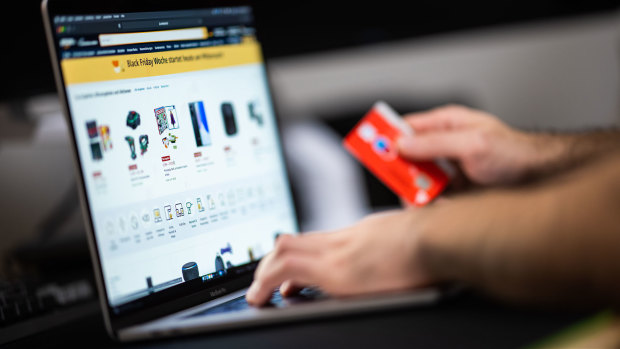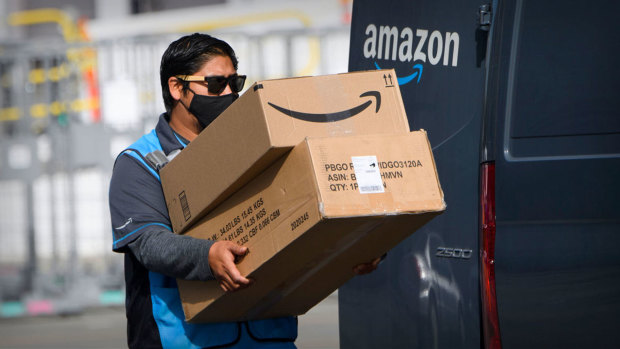
During the covid pandemic, people needed things and bought them from whichever retailer had them. In many ways, brand names lost their significance as people simply tried to meet their needs amidst supply chain problems.
You might have a preferred brand of toilet paper, yoga pants, or office products, but when the shelves were bare, people gave unknown brands a chance. That was very good news for retailers who created products specifically for sale on Amazon (AMZN) -).
DON'T MISS: Iconic bankrupt retailer headed for a brick-and-mortar comeback
Those retailers go to expose their digital-only brands to customers and because they were the only items in stock, they sold a lot of goods. This, in theory, was good for Amazon and for its third-party marketplace sellers, which created products designed to meet the needs of the online retail giant's customers.
The pandemic provided exposure, which could have launched some Amazon-owned-and-operated (O&O) private labels and/or third-party private labels to new heights. Unfortunately, for that to happen, these unknown brands would have to make an impression on customers.
In order for sales to grow, or at least stay steady when more choices were in stock, customers would need to like these brands enough to seek them out. Unfortunately for Benitago, a company that both creates and acquires brands specifically to sell products on Amazon, it could not keep that momentum up once the online retailer's inventory returned to something approaching normal.

Image source: PATRICK T. FALLON/AFP via Getty Images
Digital-only retailer built for Amazon files Chapter 11
Benitago co-founder and CEO Santiago Nestares Lampo filed for Chapter 11 bankruptcy in New York's Southern Bankruptcy court in late August.
"On August 30, 2023 (the “Petition Date”), Benitago Inc. (the “Parent”) and each of the other Debtors filed voluntary petitions for relief under Chapter 11 of the Bankruptcy Code. The Debtors continue to manage and operate their businesses as debtors in possession pursuant to sections 1107 and 1108 of the Bankruptcy Code," according to the filing.
The company was created by Lampo and his partner Benedict Dohmen in the Dartmouth dorm room while both were still college students. Their first product was Supportiback, a posture support designed to be sold through Amazon.
"From that first brand developed in our dorm at Dartmouth, the Debtors have grown into a large e-commerce brand incubator and aggregator selling nearly 1,000 products across dozens of brands covering a wide range of products including lifestyle and home goods, beauty, nutrition, sports and fitness, maternity, juvenile and baby, orthopedic, pet supply and electronic goods."
In its roughly eight-year existence, the company has both created products and acquired brands, all designed to sell on Amazon.
The company experienced "rapid growth" during the pandemic but it was hit by a "rapid and dramatic reversal of fortune due to macroeconomic forces” when the impacts of covid lessened. In the filing, the company said it plans to "right-size its business" and sell some, or all, of its brands.
More Retail:
- ‘Too pretty’ Home Depot worker faces backlash after viral mirror post
- A classic kitchenware brand files for Chapter 11 bankruptcy
- Who’s running The Gap? With no CEO, retailer hurtles towards crisis
Amazon had the same problem
Third-party brands on Amazon and even company-owned private labels struggle because the digital retailer struggles to expose them to customers. Target (TGT) -), which has had great success with O&O private labels across clothing, household goods, beauty, food, and more, has the advantage of being able to put those products on its shelves.
If a consumer walks by a product made by a brand it has never heard of, they can touch that product to gauge its quality. Amazon, for example, created multiple women's underwear and bathing suit brands. Those are very difficult product lines to sell online because quality matters.
People might have bought them during the covid period when they had no choice, but most of those brands did not convert people to become customers. That led to Amazon shutting down dozens of its O&O labels, while Target's have thrived.
That's essentially what happened to Benitago. The company can succeed in areas where it fills a need on Amazon, but it's going to struggle in areas where people are looking for a name brand, and that name brand is now back in stock.
Get exclusive access to portfolio managers and their proven investing strategies with Real Money Pro. Get started now.







